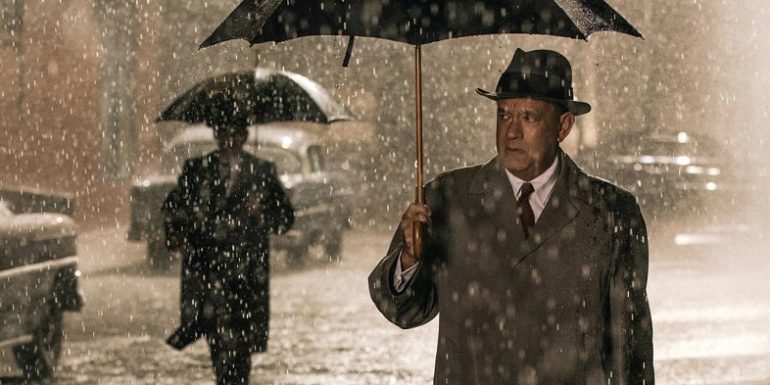Spielberg settles back into grown-up gear with his follow up to 2012’s Lincoln, the Cold War-set Bridge Of Spies. Engaging, yet perhaps too indistinct in its execution, it’s unlikely to rank amidst the upper echelons of the director’s extensive oeuvre, but thanks to key contributions from Spielberg stalwart Janusz Kaminski behind the camera, as well as an ascendent Mark Rylance, it’s a film that showcases some of the director’s strongest tendencies, only occasionally indulging those less savoury.”
A tense, almost wordless opening sequence kicks off the film’s terrific first hour, tracking Rylance’s spy, Rudolf Abel, as he evades sweaty FBI agents in sunburst 1957 Brooklyn. From the get go, Rylance’s minimalist turn wholly justifies Spielberg’s long fight to cast the actor, dating back to 1987’s Empire Of The Sun. It’s a deliberately unshowy performance, which plays upon audience intrigue to form the backbone of the opening act, as Tom Hanks’ insurance lawyer James Donovan is brought in to represent the accused spy following his arrest. A pawn on the path of a preordained death sentence, Donovan’s only purpose is to lend the impression of a fair trial for Abel, lest the Soviet Union capitalize on the propaganda potential inherent in the case.
As Donovan shocks by mounting a strong defense for his client, he finds himself under fire, both literally and figuratively. A sharp mind and expert negotiator, Hanks is no less impressive as Donovan, aided by some typically brilliantly composed dialogue from co-writers the Coen brothers. Yet his is a performance we’ve seen before. His all too few scenes with Rylance in the build-up to the trial lay out a central relationship that lend the film’s humanist message its core, the spy’s alien status illuminated by the otherworldly glow from the window of the interrogation chamber.
At the halfway mark, upon Donovan’s departure to Germany to negotiate Abel’s exchange for captured US pilot Francis Gary Powers, the film shifts gears into less involving territory. The stakes remain high, lives are still at stake, but as Donovan finds himself sinking in a mire of paranoia, Bridge Of Spies struggles to hold our investment. As ill-suited pilot Powers, Austin Sowell tries his best, yet the character is relatively underwritten, not least considering Rylance’s unfollowable act, and with Abel largely absent from the film’s latter half. Add to this Donovan’s fight to also bring home the wrongfully imprisoned American economics student Frederic Pryor (Will Rogers), and true as it might be to these valiant, admirable efforts, Spielberg struggles to retain our investment in these two relatively non-descript bargaining chips. Not that the second half of Bridge Of Spies is ever any less than entertaining – a particularly Coen-esque scene featuring Abel’s USSR commissioned stand-in family is delightfully bizarre – but it never scales the heights of its exemplary first act.
Gorgeously lensed by Kaminski on 35mm, Bridge of Spies’ timeless classical Hollywood sensibilities are visually complemented expertly. Taking the Coen’s script – co-written with Matt Charman – Spielberg succeeds where Angelina Jolie’s Unbroken faltered, mostly managing to meld his signature humanism with their cynical wit. Yet it’s Rylance, in his first major film role that enthralls the most, leaving us waiting with bated breath for his title role in Spielberg’s The BFG, arriving next year.

